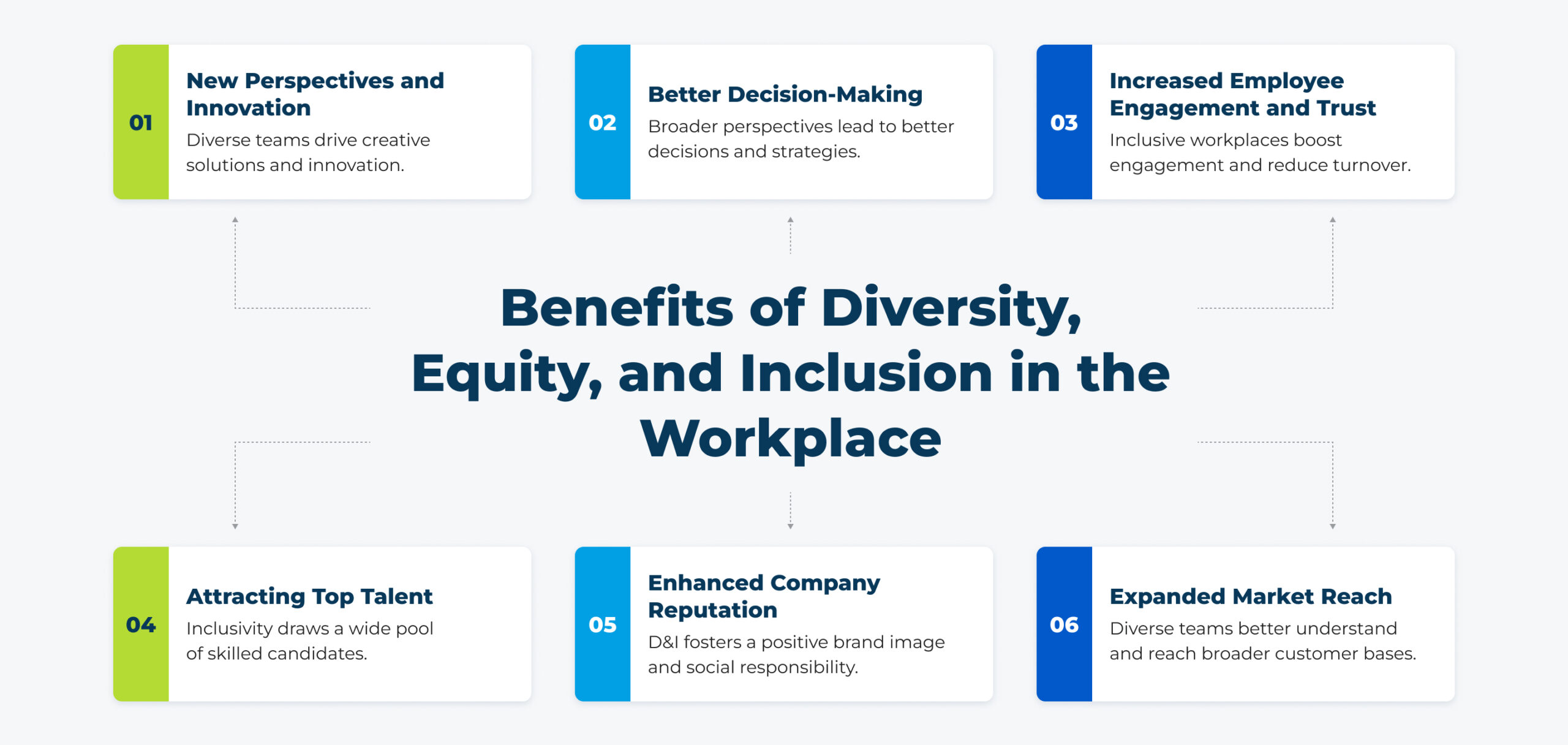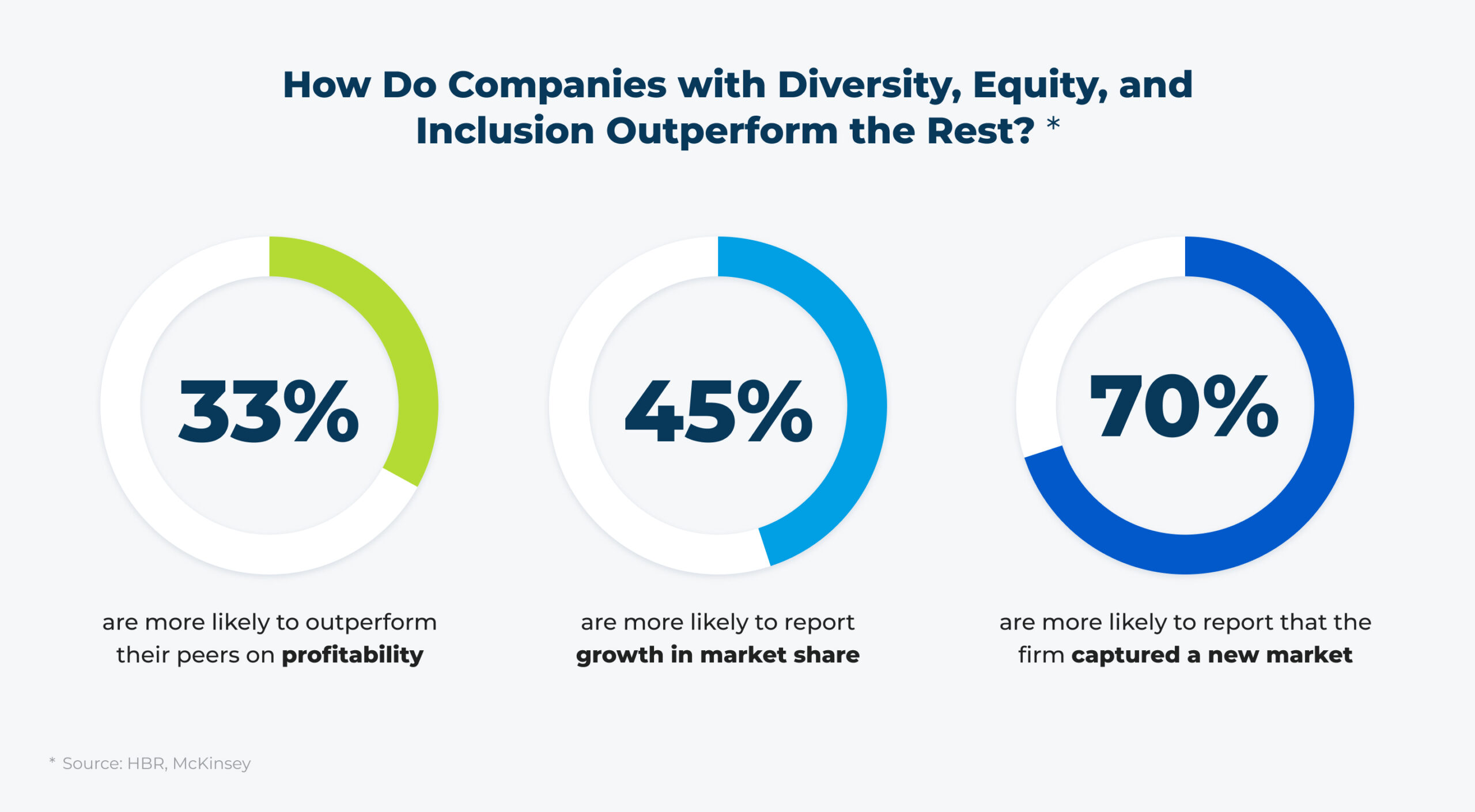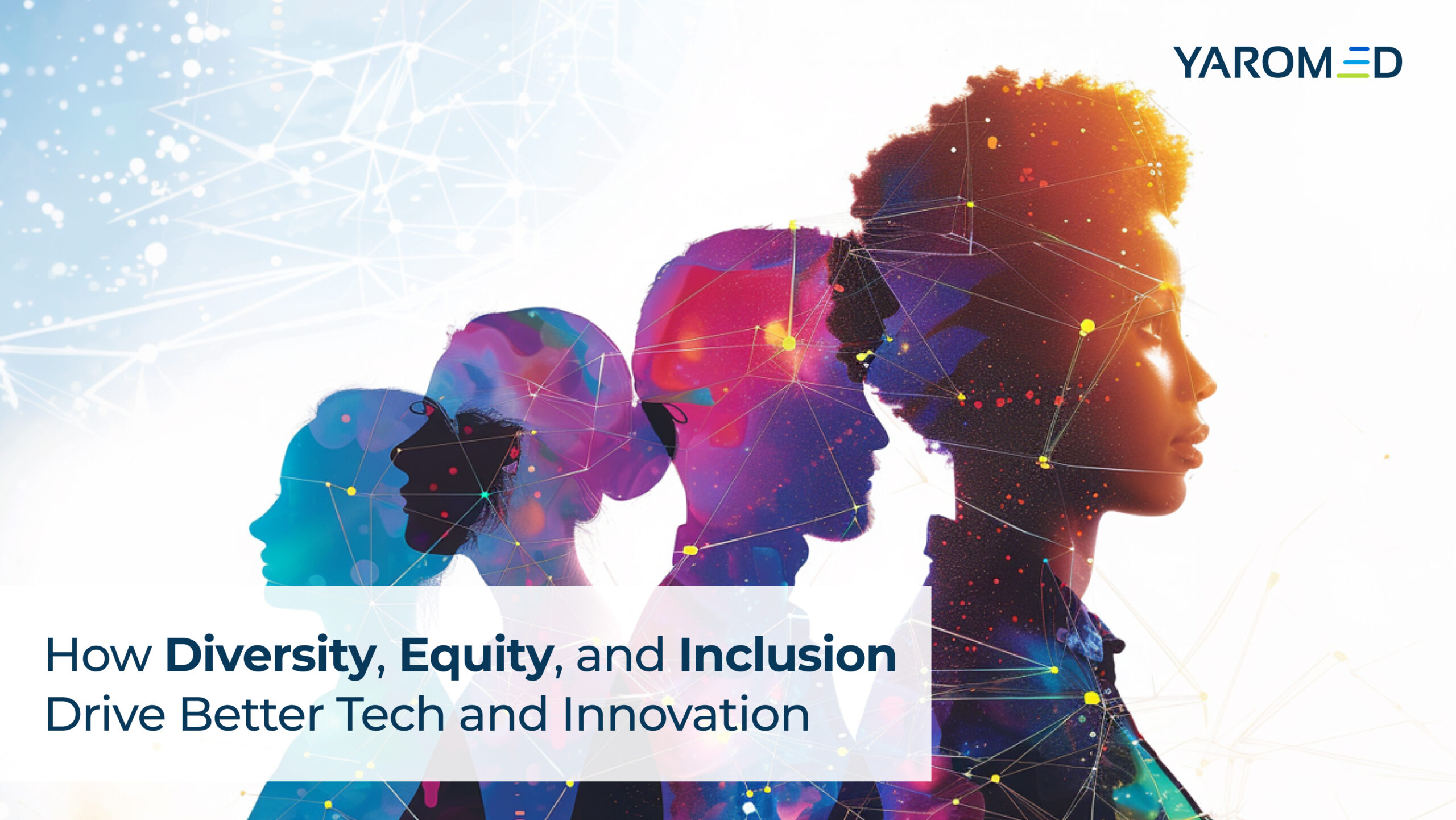Diversity, equity, and inclusion are more than just buzzwords — they are fundamental in creating a fair and equitable workplace. Equal rights and opportunities for all employees are moral imperatives and are essential for fostering a thriving and innovative work environment. Embracing diversity, equity, and inclusion (DEI) ensures that every member of your team has a chance to contribute their unique perspectives and talents. This is particularly crucial in the tech industry, where diverse viewpoints drive creativity and problem-solving, leading to progressive advancements.
This article will explore the importance of DEI, the current state of diversity in tech, and how companies like YaroMed are building inclusive organizational cultures that foster innovation.
Understanding Diversity, Equity, and Inclusion
Creating a truly inclusive workplace begins with building a deep understanding of diversity, equity, and inclusion, where each component is essential in crafting an environment where everyone can thrive.
What is DEI?
Diversity, equity, and inclusion are interconnected principles that foster fair opportunities and a sense of belonging in the workplace.
- Diversity refers to the presence of differences within a given setting. Some examples of diversity in workplaces include: differences in race, ethnicity, gender, gender identity, age, sexual orientation, ability, socioeconomic status, immigration status, and beyond.
- Equity ensures fair treatment, access, opportunity, and advancement for all individuals while striving to identify and eliminate barriers that have prevented the full participation of some groups.
- Inclusion creates environments where every individual or group feels welcomed, respected, supported, and valued. Inclusive organizations embrace all employees and enable them to make meaningful contributions.
By implementing DEI initiatives, companies can cultivate a workforce that is not only fair and ethical, but also more innovative, successful, and competitive.

The Persistent Challenge of Diversity, Equity, and Inclusion in Tech
Despite growing awareness of DEI's importance, the tech industry grapples with persistent underrepresentation of women, members of the LGBTQ+ community, people from some racial groups, elderly people, individuals with disabilities, and people from lower socioeconomic backgrounds.

Women hold only 25% of computing and math occupations, according to Enterprise Apps Today and that number is expected to shrink to just 15%, as stated in Deloitte Insights. This underrepresentation is often attributed to an unconscious bias in the hiring and promotion processes. Deloitte's research reveals an 8-10% discrepancy between the proportion of women in the overall workforce and their representation in technical and leadership roles, indicating ongoing bias. A lack of diverse leadership creates a greater disadvantage to underrepresented groups, creating a sense of isolation and hindering career growth. Additionally, the absence of crucial support systems like mentorship programs and employee resource groups (ERGs) exacerbates this problem.
Members of the LGBTQ+ community face an even bleaker situation, with statistics showing that a mere 2-3% of the tech workforce identifies as LGBTQ+, according to WomenTech Network, despite their more significant presence in the general population. The lack of representation and support for LGBTQ+ employees can lead to a less inclusive work environment, making it challenging for them to thrive and advance in their careers.
Turning to racial underrepresentation, black and hispanic professionals also face significant challenges. For example, they only make up around 17% of Google's U.S. technical staff, as Google's Annual Diversity Report indicates. These groups encounter similar barriers to advancement, including unconscious bias and a lack of supportive networks, which can impede their career growth and limit their contribution to innovation.
The tech industry also struggles to be inclusive of other underrepresented groups. Ageism is a significant issue, with tech workers over 40 being 26% less likely to be hired and 33% more likely to lose their jobs compared to younger employees, according to a Visier Insights Report.
People with disabilities face significant barriers to entering and succeeding in the tech field, often due to a lack of accessibility and support.
Similarly, individuals from lower socioeconomic backgrounds encounter obstacles such as limited access to education and resources, hindering their career progression in tech.
Unlocking Innovation by Embracing Diversity, Equity, and Inclusion
Despite the challenges described in the section above, successful DEI initiatives offer a path forward for employees as well as organizations.
By supporting DEI, companies can unlock significant benefits. Diverse teams, with their varied perspectives and approaches, are better equipped to develop progressive solutions. This diversity of thought fuels creative ideas that might not emerge in homogenous groups. The fast-paced tech industry grows through constant innovation, and diverse teams are better positioned to meet these challenges.
Extensive research confirms the positive correlation between DEI and innovation:

A McKinsey report reveals that companies in the top quartile for ethnic and cultural diversity are 33% more likely to outperform their peers on profitability. Another study by Boston Consulting Group examined 1,700 entities across the globe and found that companies with more diverse leadership teams reported higher innovation-related revenues.
The impact of DEI on organizational growth is undeniable as well. Diverse teams are 45% more likely to report growth in market share over the previous year and 70% more likely to report that the firm captured a new market, according to the Harvard Business Review.
The necessity to embrace DEI is evident in many leading technology companies. Microsoft, with its diversity training programs and ERGs, and Google, through its unconscious bias training, diverse hiring practices, and programs like Women Techmakers, demonstrate the positive impacts of DEI, fostering a more inclusive culture and supporting underrepresented employees.
The key characteristics of successful DEI initiatives include:
- Comprehensive Training: Programs that equip employees to recognize and mitigate unconscious bias are crucial.
- Support Networks: Establish ERGs and mentorship programs provide essential support for underrepresented groups.
- Leadership Commitment: Strong leadership commitment is vital for driving meaningful DEI progress.
Building an Inclusive Culture at YaroMed
Building a Culture of Belonging
- Actionable Initiatives: We're actively implementing programs that break down barriers and foster a sense of belonging. This includes unconscious bias training and diverse recruitment strategies targeting a wider talent pool. Additionally, we attend special events focused on diversity and inclusion. We also hold a Certificate of Diverse Ownership that reflects our commitment to upholding these values.
- Leadership Commitment: Our leadership team champions DEI by setting clear goals, holding themselves accountable for progress, and fostering a culture of respect.
- Safe and Respectful Workplace: We have zero tolerance for discrimination and/or harassment. We have clear policies and procedures in place to ensure everyone feels safe speaking up and contributing their unique perspectives.
- Empowering Potential: Our mentorship and sponsorship programs connect experienced employees with those from underrepresented groups. This guidance and support helps everyone excel and achieve their highest potential.
- Continuous Learning: We invest in the ongoing training on diversity, inclusion, and cultural competency, ensuring that each and every member of our team, at YaroMed, deeply understands these concepts and can effectively serve our diverse clients.
By cultivating an inclusive environment, YaroMed attracts and retains top talent while fostering collaboration and innovation. This culture ensures we deliver exceptional services that reflect the diverse needs of our clients, providing the highest quality of outcomes from a team that values and understands each others’ unique perspectives.
Conclusion
Diversity, equity, and inclusion are not just ethical imperatives, but are also strategic advantages in the tech industry. By fostering a diverse and inclusive culture, companies can enhance creativity, improve decision-making, and drive innovation.
YaroMed’s commitment to DEI exemplifies how embracing diversity can lead to groundbreaking advancements and more engaged employees. As we look to the future, it is clear that prioritizing DEI will be crucial for sustained success and innovation in tech.

